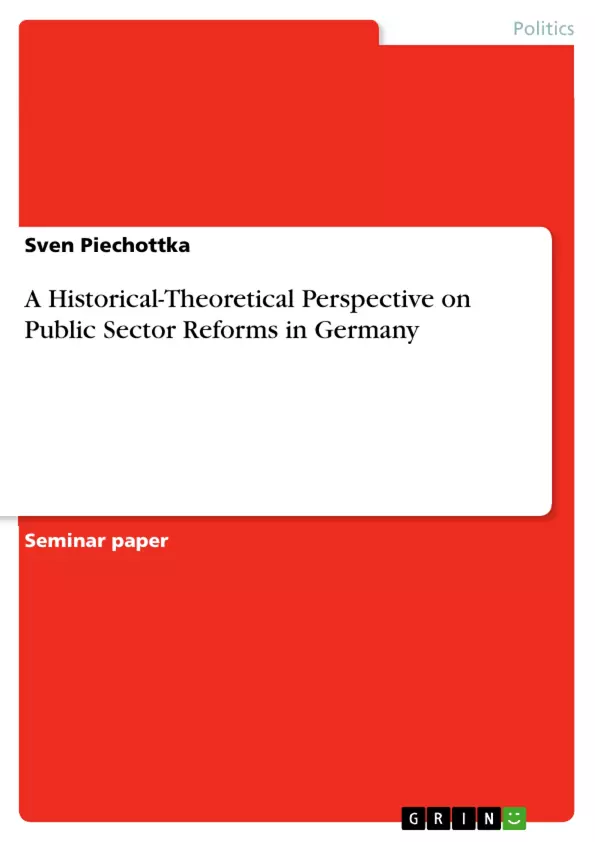In this short paper, I want to compare major reform waves in German bureaucratic history. I describe and explore if certain clusters of reform periods relate to the Big Theory schools of administrative science. The results suggest that most administrative reforms took place in an institutionalist mindset that can be related to models such as path dependency and institutional isomorphism. Attempts to reform the German administrative body are seen to have hardly reached their desired results, nevertheless, especially reforms in the early decades were attributed valuable success by administrative scholars.
Inhaltsverzeichnis (Table of Contents)
- Introduction
- State of Research and Research Question
- Explanation Tools: Three Schools of "Big Theory"
- Neo-Institutionalism
- Rational Choice / Principal Agent
- Governance Network
- Historical Reform Periods
- Conclusion
- List of References
Zielsetzung und Themenschwerpunkte (Objectives and Key Themes)
This paper explores the relationship between major reform periods in German bureaucratic history and key administrative theories, aiming to determine if specific reform clusters align with the "Big Theory" schools. The study investigates whether a discernible pattern of administrative science paradigms exists within the historical evolution of German public administration.
- Analyzing historical reform periods in German bureaucracy
- Examining the influence of "Big Theory" schools on these reforms
- Identifying patterns of paradigm shifts within administrative science
- Exploring the success and challenges of administrative reform initiatives in Germany
- Assessing the applicability of specific theoretical schools to the German administrative structure
Zusammenfassung der Kapitel (Chapter Summaries)
The introduction sets the context for the study by highlighting the evolving nature of bureaucracies and the impact of administrative science on policy-making. The research question is formulated, focusing on identifying the underlying assumptions of German administrative reforms in recent decades. The paper also provides a brief overview of relevant research that has explored the historical perspective of German reform waves.
Chapter 3 delves into the "Big Theory" schools of administrative science, including Neo-Institutionalism, Rational Choice / Principal Agent, and Governance Network. Each school is presented with its key concepts and prominent authors, providing a framework for analyzing the historical reform periods.
Chapter 4 outlines the historical phases of administrative reforms in Germany, recognizing that these reforms have generally occurred in waves rather than through incrementalism. The paper draws upon existing research to identify key reform periods. The following chapters would delve into the specific details of each reform period, analyzing their underlying assumptions and potential relationships to the "Big Theory" schools.
Schlüsselwörter (Keywords)
The core concepts explored in this paper include German administrative reforms, "Big Theory" schools, Neo-Institutionalism, Rational Choice Theory, Principal-Agent Problem, Governance Network, path dependency, institutional isomorphism, reform clusters, historical analysis, and administrative science paradigms.
Frequently Asked Questions
What are the major reform waves in German bureaucratic history?
The paper examines historical clusters of administrative reforms in Germany, looking at how they align with different schools of administrative science over recent decades.
Which "Big Theory" schools are discussed in the paper?
The three main schools are Neo-Institutionalism, Rational Choice (including Principal-Agent theory), and Governance Network theory.
What is the significance of Neo-Institutionalism in German reforms?
The results suggest that many German administrative reforms were driven by an institutionalist mindset, characterized by path dependency and institutional isomorphism.
How successful have administrative reforms been in Germany?
While early reforms were often seen as successful by scholars, more recent attempts have frequently struggled to reach their desired results due to the complexity of the bureaucratic body.
What is "institutional isomorphism" in this context?
It refers to the process where organizations (like administrative bodies) tend to become similar to each other over time, often imitating successful structures from other sectors or countries.
- Citation du texte
- Sven Piechottka (Auteur), 2016, A Historical-Theoretical Perspective on Public Sector Reforms in Germany, Munich, GRIN Verlag, https://www.grin.com/document/372001



